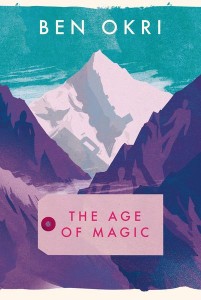Nigerian author Ben Okri reflects on how moving from the UK to Africa as a child introduced him to new experiences that were to be a big influence on his future writing

© Janie Airey
Writing should be a lifelong experience, says Ben Okri, the Nigerian poet and author. Since publishing his first novel, Flowers and Shadows, at the tender age of 21, Okri has risen to international acclaim. His best known work, The Famished Road, was awarded the 1991 Booker Prize.
As a newcomer to Okri’s work, you would be forgiven for seeing it as somewhat obscure. His ideas, he says, are born “out of the strangeness of reality”. To put this into context, he refers to a time when he first noticed the peculiarity of everything around him, when travelling back to Nigeria from the UK as a young boy. “Everything was strange,” he says, “the trees, and the streets, everything was unusual, and therefore brimming over with ideas.”
In order to reflect this perceived strangeness of reality, Okri expresses himself in a very different way to what he calls the “old Western novel”, referring to books written by the likes of Jane Austen. This older style of writing, he says, follows a sequential pattern, born from a sequential way of thinking taught within Western institutions. Okri’s writing attempts to convey a new way of thinking, to show that writing does not need to follow a strict criteria and can instead be perceived in any number of unique ways – it can be sequential, he says, or “circular and dancing”.
Okri was participating in the Cambridge Festival of Ideas – a week-long University of Cambridge public event celebrating the arts, humanities and social sciences. He reflected on his colourful writing career, sharing a stage with Tim Cribb, an English fellow at the university. Crowds of people turned up to listen to Okri speak. He was invited to begin reading from one of his poems, with the audience duly advised that there was a problem with the sound system, and so we would have to listen carefully. As Okri rose to begin his recital, the audio equipment suddenly crackled into life and the auditorium exploded into applause.
Okri, however, seemed reluctant to speak into the microphone. “I think I will abandon this,” he said, gesturing towards the device. “I do not like to raise my voice. The gentler I speak the clearer I think.
“It is wonderful to be here,” he added, lamenting on what a lovely day it was for such a splendid turnout. “You must love ideas more than sunlight,” he commented, smiling. “That’s unwise.”
Although he was born in west-central Nigeria to an Urhobo family, Okri spent the majority of his early life in London, only returning to Nigeria in 1968 when the country was in the midst of civil war. These experiences dramatically shaped his writing. While Okri has won several esteemed prizes for his work, including the 1987 Commonwealth Writer’s Prize, his ability to write emerged only after completing a long and arduous journey.
“As a child,” Okri reflects, “I would read Plato and the classics, and once, my father told me ‘we have our own Platos’. This confused me, and so I asked ‘Where?’.”
His father’s response to this, Okri shows the audience, was to simply gesture all around him. After many years of not fully understanding what his father meant, Okri says that the realisation suddenly dawned on him. His father’s gesture, he now understood, meant: “It is here, you’re just not seeing it.” This realisation, he says, led to more than seven years of self-discovery through writing, a period Okri refers to as his “critical crisis”. Throughout this time he attempted to break down the barriers of language to establish a way of conveying his new look at reality. “Try and get a dimensional reality into sequential prose,” he challenges, “it cannot deal with it – it does not work!”
“The difficulty in writing,” Okri says, “is finding the language to express these ideas without the need for explanation.” Writing, Okri believes, should serve as the special explanation of ideas, where a literal explanation is not needed. The solution to the problem lies within the discovery of language.
Ideas can only exist outside of the mind with the right language; “Otherwise they exist only in their own reality,” he adds.
And more than anything, you must write something which hasn’t been written before. “What are you going to write if it has already been done so beautifully before? How can you do what Dostoyevsky has already done? The whole point in writing is to not repeat – you invest your life in a journey, and if you repeat each day you are effectively writing yourself out of existence.”
In this way, Okri focuses his own writing on the micro moments that have gone unnoticed in more traditional methods of writing. “Everyone focuses on the big moments,” he says, “but reality is in the micro moment, grind it down and you see the seedbeds of the greater moments.”
While uncovering such a method of writing for oneself may seem slightly terrifying to the fledgling writer, reaching a point where you have something unique is the ultimate challenge. “Writing when you do not know where you are going is frustrating and painful,” he says, “but the process, and the finished work, is more fruitful, more rewarding and more beautiful.”
‘Some things only become clear much later’
The Age of Magic
Ben Okri, Head of Zeus, London, 2014
287pp, ISBN 978-1784081478

Ben Okri’s first novel in seven years, The Age of Magic, follows the journey of a film production team travelling from Paris to Basel while filming a documentary. As the voyage unfolds, the team find themselves followed by shadows, plagued by ghosts, troubled by their pasts and enlightened by the world around them.
“What does Arcadia mean to you?” is the subject of the documentary and, increasingly, the question on each of the crew’s minds. The characters are troubled – burdened with their own physical and emotional baggage, in the form of invisible ghommids, trolls, niebelungens, gnomes, harpies, sprites and an elusive quylph. When they are together, the crew speaks increasingly of a disconcerting presence among them – the ever-present, domineering figure of Malasso, the name given by the crew to a haunting, shadowy spectre which stalks the group.
When they arrive at a hotel in a small Swiss town, in the eye of the domineering Rigi Mountain, they are at once gripped by the serene beauty around them. Over the course of the stay, they each find themselves drawn towards the mystery of the crystal clear lake on the edge of the hotel grounds and the secrets of the mountain town.
The novel takes the reader on a journey unlike any other, presenting characters with a different way of seeing the world and offering the reader a very different way of reading. As the crew are transformed by their journey, so too is the reader.
The Age of Magic unfolds to form a truly dreamlike story, with characters wandering like ghosts in a world that seems to form and fall away before their very eyes.





